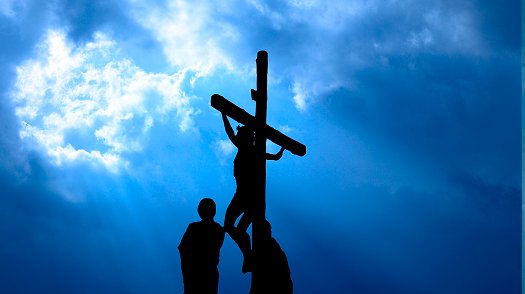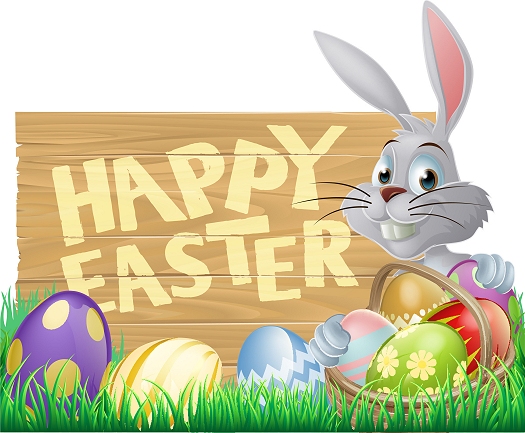All you need to know about Easter....

Every year as Easter approaches, the shops are filled with chocolate eggs, egg-colouring kits, stuffed, real and chocolate bunnies of all types, and baskets for carrying all of this Easter bounty. However, most of us know that Easter isn't simply a commercial spring festival about dyeing and hiding eggs or wearing new spring attire. Easter is the Christian observance of the crucifixion of Jesus Christ and his resurrection days later. It is the central festival of the Christian church and, after the Sabbath, it is the oldest Christian observance.
Unlike festivals such as Christmas, Easter has been celebrated without interruption since New Testament times. The dates of all movable feasts are also calculated around the date of Easter. According to the Encyclopaedia Britannica, "...western Christians celebrate Easter on the first Sunday after the full moon (the paschal moon) that occurs on or next after the vernal equinox on March 21. If the paschal moon, which is calculated from a system of golden numbers and epacts and does not necessarily coincide with the astronomical full moon, occurs on a Sunday, Easter is the following Sunday." During New Testament times, the Christian church celebrated Easter at the same time as the Jews observed Passover (the first of Passover's eight days is Nissan 15 on the Jewish calendar. Passover observes the flight and freedom of the Israelites from slavery in Egypt). By the middle of the second century, Easter was celebrated on the Sunday after Passover. The Council of Nicaea decided in 325 A.D. that all churches should celebrate it together on a Sunday. The Eastern Orthodox church may celebrate Easter up to a month later, as its calculation of the date is based on the Julian calendar, which is currently 13 days behind the Gregorian calendar. Quite often the Easter observance in both eastern and western churches coincided. In some countries, Good Friday and the Monday after Easter are national holidays.
Easter Dates For Your Calendar
Easter falls at different times because they follow the Jewish Lunar Calendar and not the Solar Gregorian Calendar.
Easter Calendar 2026
February 18 Ash Wednesday
March 29 Palm Sunday
April 2 First Day Of Passover
April 3 Good Friday
April 5 Easter Day
April 6 Easter Monday
Palm Sunday
Palm Sunday is the sixth and final Sunday of Lent. In many churches, it is the beginning of Holy Week, a week of observances leading up to Easter Sunday. Palm Sunday occurs one week before Easter and marks Jesus' entry into Jerusalem when his supporters waved palm fronds to celebrate his arrival. Today, many people use the ashes from palm fronds used on the previous year's Palm Sunday to mark a cross on the forehead of penitents on Ash Wednesday.
Maundy Thursday
The word "maundy" may have come from the maund (or mand) basket used by the fishermen in the English counties of Norfolk and Suffolk. Centuries ago, there was a fair held on this day in Norwich (Norfolk), at which vendors sold horses, cattle and general merchandise. Some of the fisher-folk brought their maund baskets filled with items to sell, including fish. Clothing and hats were sold, as it was customary to buy a new item of clothing for Easter Sunday. This may well have been the origin of the Easter bonnet and the notion of wearing new spring attire for Easter. Maundy Thursday may also have come from the Latin word "mandatum," meaning "commandment," as in the Biblical words of Jesus.

Good Friday
The Friday before Easter is called Good Friday, and is a somber observance of Christ's crucifixion on the cross. Christians believe that the death of Jesus Christ on the cross made it possible for them to know peace with God. They wanted to celebrate their peace rather than observe Friday as a day of mourning or sadness. The name may also be derived from God's Day, since in the first two centuries, the word "good" would only ever have been used as a description for God. The Saxons and Danes called this day Long Friday, and Good Friday in Danish is Langfreday.
Easter Sunday
Easter Sunday celebrates Jesus' resurrection. Along with Christmas, Easter is considered one of the oldest and most joyous days on the Christian calendar. Religious services and other Easter celebrations vary throughout the regions of the world and even from country to country. It is important to understand that Easter was not celebrated or mentioned in the Bible. Rather, the three days from Good Friday through Easter Sunday has become a traditional observance of when Christians believe that the crucifixion, burial and resurrection of Christ occurred.
Commercial Easter
Celebrations In addition to the religious celebrations and observances of Easter, many countries also celebrate Easter with sweets and baked goods. Eggs, a traditional symbol of new life, are hard-boiled and dyed. Chocolate sweets of all shapes and sizes are bought. Cakes and breads are baked and carefully decorated. And in many homes, families celebrate Easter with a gathering of family for an elaborate Easter dinner.
Easter Eggs
According to the book "Festivals and Celebrations," eggs were dyed in ancient times by the Egyptians and Persians, who then exchanged them with friends. "It was in Mesopotamia that Christians first gave eggs to their friends at Easter to remind them of the resurrection of Jesus," Centuries ago, when Lent ended on Easter Sunday, it became tradition for people to give decorated eggs as presents to their friends and servants. Over time, the tradition of painting or decorating eggs has continued, particularly with the Ukrainians and other eastern Europeans known for their beautiful and intricate designs. The bejeweled "Easter Egg" created by the artist Peter Carl Faberge in the late 1880s in St. Petersburg, Russia, is the extreme of egg decorating.
The Easter Bunny

Rabbits are a powerful symbol of fertility and new life, and therefore, of Easter. The Easter Bunny, like Santa Claus, has become a popular children's character. But it may be that the Easter Bunny is something of a historical mistake. Hares were sacred to the pagan festival of Eostre. At some point, the hare was replaced by the rabbit (some say that this is because it is difficult to tell hares and rabbits, both long-eared mammals, apart).
Hot Cross Buns
Hot cross buns used to be kept specially for Good Friday with the symbolism of the cross, although it is thought that they originated in pagan times with the bun representing the moon and its four quarters." The custom of eating hot cross buns goes back to pre-Christian times, when pagans offered their god, Zeus, a cake baked in the form of a bull, with a cross upon it to represent its horns. Throughout the centuries, hot cross buns were made and eaten every Good Friday, and it was thought that they had miraculous curative powers. People hung buns from their kitchen ceilings to protect their households from evil for the year to come. Good Friday bread and buns were said never to go moldy. This was probably because the buns were baked so hard that there was no moisture left in the mixture for the mold to live on. Hot cross buns and bread baked on Good Friday were used in powdered form to treat all sorts of illnesses.
Worldwide Easter Celebrations
Here are a few ways in which Easter is celebrated by Christians around the world:
Bulgaria - In Bulgaria, people don't hide their eggs -- they have egg fights! Whoever comes out of the game with an unbroken egg is the winner and assumed to be the most successful member of the family in the coming year. In another tradition, the oldest woman in the family rubs the faces of the children with the first red egg she has coloured, symbolising her wish that they have rosy cheeks, health and strength (much like the Easter egg).
Mexico - Easter and related holidays are colourful and lively in Mexico, where children actually smash eggs over each other's heads in the week before Lent begins! Fortunately, these eggs are filled with small pieces of paper rather than raw egg.
Germany - In Germany, eggs are dyed green on Maundy Thursday.
Greece - On Easter Sunday in Greece, there is a public procession.
Red eggs (red for the blood of Christ) are tapped together while one person declares "Christ is risen" and another replies "Truly, He is risen."
United States - Parades are traditional in some U.S. cities. Atlantic City's 140-year-old parade is the oldest, and the promenade on New York City's Fifth Avenue, immortalised in Irving Berlin's song, "Easter Parade," is perhaps the best known.
England - In Hallaton (in the county of Leicestershire), on the Monday following Easter, there is the Hare Pie Scramble and Bottle Kicking. The story goes that a woman was saved by a hare running across the path of a bull on Easter Monday hundreds of years ago. As a token of her appreciation, she bequeathed a piece of land to the rector. The sole condition to this bequest was that the rector have a hare pie made to be distributed to parishioners together with a large quantity of ale every year.
Another interesting custom: Some countries have "pace egg rolling." Eggs are rolled downhill as a symbol of the stone being rolled away from the tomb where Jesus was laid. This became popular despite scholars' assertion that the stone over the tomb was actually rolled uphill!
